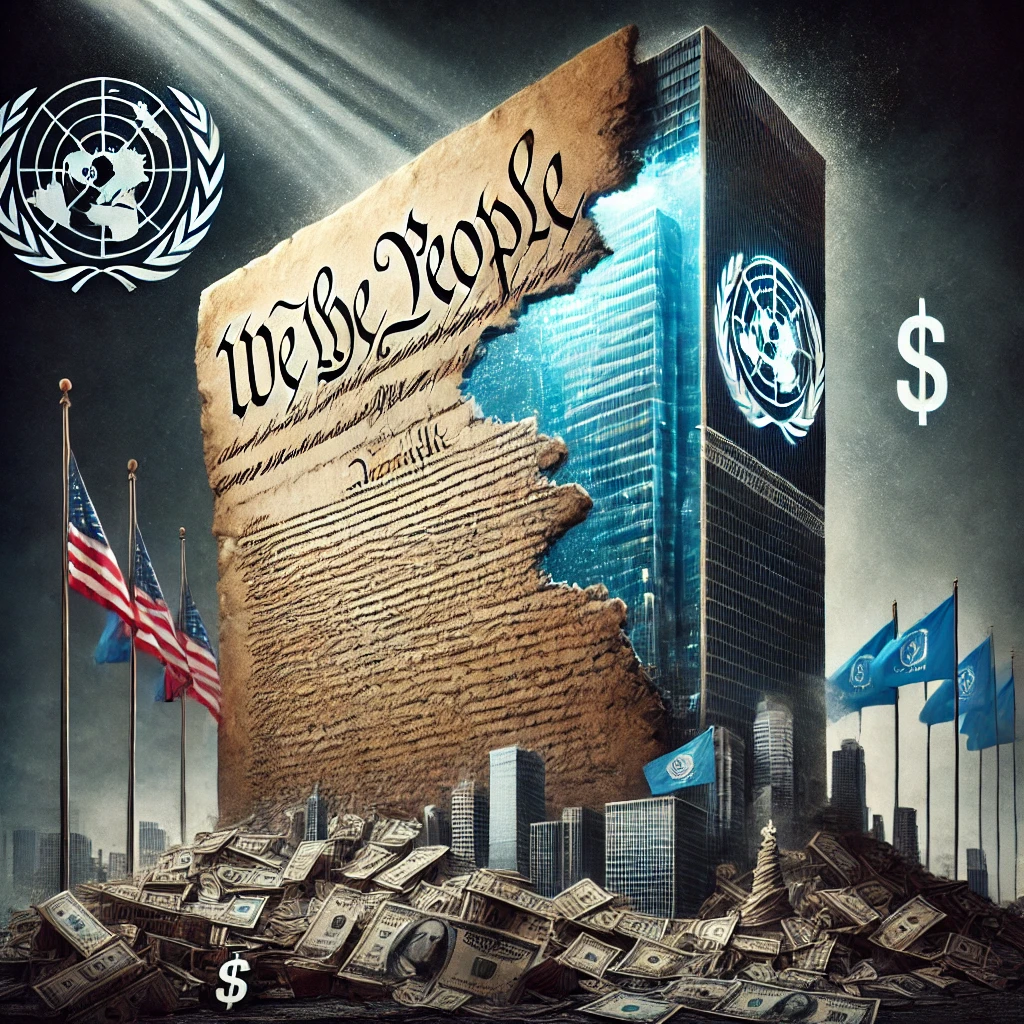The Constitution of the United States was drafted to establish a government that would protect individual liberties, limit centralized power, and provide a framework for governance rooted in democratic accountability. For much of the nation’s history, these ideals stood as a bulwark against tyranny. However, over the past century, corporate influence and unelected global governance have steadily eroded the principles enshrined in the Constitution. What began as an effort to ensure economic dynamism has transformed into a system that prioritizes the interests of corporations and elites over the collective will of the people.
This shift is not a natural progression but a deliberate distortion of constitutional ideals. The rise of corporate personhood, the influence of money in politics, the dominance of multinational corporations, and the growing power of unelected global institutions all point to a systematic dismantling of national sovereignty. These trends are reshaping governance in ways that threaten not just the United States but the very fabric of Western democracies.
One of the most profound ways the Constitution has been subverted is through the concept of corporate personhood. This legal doctrine grants corporations many of the same rights as individuals, fundamentally altering the relationship between government, corporations, and citizens. The 14th Amendment, intended to protect the rights of freed slaves, was repurposed in the late 19th century to shield corporations from regulation. The case of Santa Clara County v. Southern Pacific Railroad in 1886 is often cited as a pivotal moment in this shift, even though the decision itself did not explicitly grant corporate personhood. Instead, a court reporter’s note laid the groundwork for this transformation. Over time, this principle has been expanded to give corporations rights that allow them to wield immense power in political and economic spheres.
The Citizens United v. Federal Election Commission ruling in 2010 amplified this dynamic by equating money with free speech. This decision allowed corporations and unions to spend unlimited amounts on political campaigns, effectively giving them the ability to shape elections and policy to suit their interests. The result has been the domination of political discourse by well-funded entities, marginalizing the voices of ordinary citizens and undermining the principle of equal representation. When corporations can outspend individuals and grassroots movements, democracy becomes a tool for the wealthy rather than a mechanism for collective decision-making.
Corporate influence extends beyond elections. Regulatory agencies, designed to act as watchdogs, often fall victim to regulatory capture, where industries effectively control the very bodies meant to oversee them. The revolving door between government and corporate sectors exacerbates this issue. Former corporate executives frequently take positions in regulatory agencies, and government officials often transition into lucrative private-sector roles after their tenure. This dynamic ensures that regulations are crafted with industry interests in mind, often at the expense of public health, environmental sustainability, and workers’ rights. Laws that should protect the public are instead tailored to shield corporations from accountability, creating a system where profits trump the common good.
While corporations dominate domestic governance, unelected global institutions are increasingly shaping policies that undermine national sovereignty. Organizations like the United Nations, the World Economic Forum (WEF), the International Monetary Fund (IMF), and the World Trade Organization (WTO) wield significant influence over global trade, environmental standards, and economic policies. These bodies are not accountable to voters, yet their decisions often have far-reaching implications for domestic laws and policies.
Global trade agreements are a prime example of how these institutions undermine sovereignty. Deals like the North American Free Trade Agreement (NAFTA) and the Trans-Pacific Partnership (TPP) have prioritized the interests of multinational corporations over those of workers and local communities. These agreements often include arbitration mechanisms that allow corporations to challenge domestic laws if they are deemed to interfere with profits. This process bypasses national courts and undermines the ability of governments to enact policies in the public interest.
Economic dependence on global supply chains has further eroded national sovereignty. The outsourcing of manufacturing and critical industries has made Western nations, particularly the United States, reliant on foreign powers. This dependence not only weakens economic resilience but also exposes nations to external pressures and manipulation. For instance, reliance on Chinese manufacturing and rare earth materials creates vulnerabilities that can be exploited in geopolitical conflicts.
Cultural fragmentation has compounded these challenges. In the West, identity politics and ideological divisions have fractured societies, making it harder to build consensus on national priorities. Media narratives, often shaped by corporate interests, exacerbate these divisions by promoting polarizing content that distracts from systemic issues. The focus on individual identities and grievances undermines the sense of shared purpose that is essential for collective action.
Unelected global governance adds another layer of complexity to this issue. During crises such as the COVID-19 pandemic, organizations like the World Health Organization (WHO) issued directives that effectively sidelined national legislatures and executives. While these measures were framed as necessary for addressing global challenges, they often lacked transparency and accountability, further eroding trust in public institutions. The push for centralized solutions to global problems, such as climate change and pandemics, often comes at the expense of local governance and individual freedoms.
These trends are not accidental. They reflect a deliberate effort to weaken the sovereignty of Western nations and transfer power to global elites. Proponents argue that centralized governance is necessary to address transnational challenges, but critics contend that these efforts prioritize the interests of the few over the many. The push for a “Great Reset,” championed by the WEF, exemplifies this dynamic. Framed as a response to economic and environmental crises, the Great Reset advocates for a reimagining of capitalism and governance. While its supporters claim it will create a more equitable world, its critics warn that it will entrench the power of corporations and unelected elites at the expense of democracy and individual freedoms.
The consequences of these trends are profound. If left unchecked, the erosion of constitutional principles and national sovereignty will fundamentally alter the nature of governance in the United States and other Western democracies. The principles of liberty, accountability, and self-determination that underpin the Constitution are at risk of being replaced by a system that prioritizes centralized control and elite interests.
To counter these challenges, it is essential to take deliberate steps to restore the principles enshrined in the Constitution. These include:
- Reforming campaign finance laws to limit the influence of money in politics and ensure fair representation.
- Strengthening antitrust laws to break up monopolies and reduce corporate dominance in key industries.
- Reassessing international agreements to ensure they align with national interests and constitutional principles.
- Investing in domestic manufacturing and reducing reliance on global supply chains to rebuild economic resilience.
- Limiting the influence of unelected global institutions by prioritizing local governance and democratic accountability.
- Educating citizens about their rights and the importance of civic engagement to rebuild trust in democratic institutions.
- Promoting unity by emphasizing shared values and common goals over divisive identity politics.
The Constitution was designed to empower the people, not corporations or unelected elites. Reclaiming its principles requires vigilance, action, and a commitment to the ideals of liberty and self-governance. This is not just an American struggle; it is a global one. By addressing these issues, the United States can lead the way in demonstrating that a free and sovereign people can resist the tide of centralization and reclaim their destiny.



